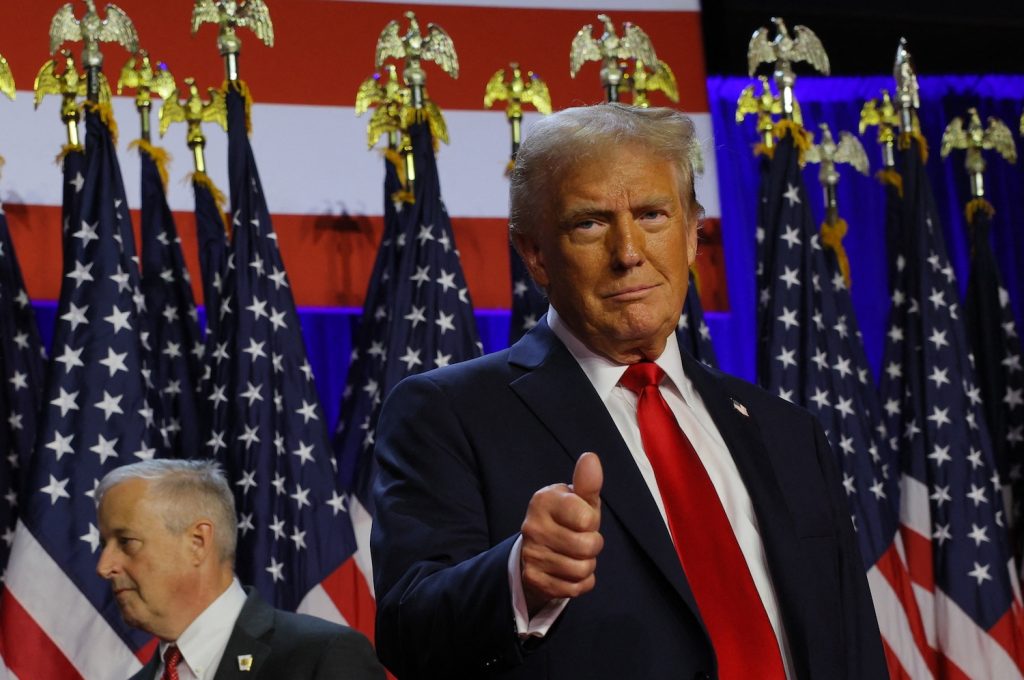Donald Trump’s victory in the U.S. presidential election has raised significant concerns about the future of global trade, with many wondering whether his proposed policies could spark a trade war. During his campaign, Trump repeatedly vowed to impose tariffs on all goods imported into the United States. Now, businesses, economists, and governments worldwide are scrambling to determine the full implications of his victory and whether his rhetoric will translate into action.
Trump has long viewed tariffs as a tool to boost the U.S. economy, protect American jobs, and increase government revenue. While in the past, his tariffs have targeted specific countries, such as China, or particular industries, like steel, his campaign pledge to impose a broad tax of 10% to 20% on all foreign goods could have far-reaching consequences on prices and global trade flows.
Targeting Europe and Beyond
One of Trump’s key criticisms during his campaign was directed at Europe, particularly the European Union. In a statement, he questioned why European countries, which export millions of cars to the U.S., do not buy American agricultural products. He threatened to impose hefty tariffs on European goods, particularly targeting car manufacturers like BMW, Mercedes, and Volkswagen. After Trump’s victory, shares of these German carmakers dropped by 5% to 7%, as the U.S. remains their largest export market.
Trump’s stance on tariffs has been a consistent theme throughout his presidency and his election campaign. He has often referred to tariffs as a “weapon” and described them as a solution to a range of global challenges, from containing China’s economic rise to addressing issues like illegal immigration. “Tariff is the most beautiful word in the dictionary,” he famously said, indicating that he intends to use this tool aggressively.
However, while Trump’s focus has largely been on China, his threats of tariffs are not confined to that country. The European Union, which has already faced U.S. tariffs on steel and aluminum, is bracing for potential retaliatory actions if Trump follows through with his plans. In fact, European officials are already preparing a list of countermeasures, having learned from previous experiences when Trump imposed tariffs despite warnings from international allies.
The Risk of a Global Trade War
The consequences of such broad tariffs could be severe. The International Monetary Fund (IMF) has warned that a major trade war could shrink the global economy by as much as 7%, equivalent to the combined size of the French and German economies. With global trade making up a large portion of economic activity, any disruption could have widespread ramifications.
Europe has historically responded to U.S. tariffs with its own retaliatory measures. In the past, the EU has targeted iconic American products, such as Harley Davidson motorcycles, Levi’s jeans, and bourbon whiskey, as a response to U.S. duties on European goods. A senior Eurozone central banker noted that while U.S. tariffs may not cause inflation in Europe, the reaction of European governments could determine the broader economic impact.
The possibility of a trade war is also a pressing issue for the United Kingdom, particularly in light of Brexit. The UK has been seeking to forge its own path outside the European Union, but with a potential transatlantic trade war looming, the government faces tough questions about where it should position itself in this global conflict. The UK has been leaning toward closer alignment with the EU, especially on issues like food and agricultural standards, which could complicate any potential trade deal with the U.S.
The UK’s Dilemma: Ally or Neutral?
The UK has expressed interest in becoming a neutral player in any trade disputes, but it could struggle to remain uninvolved, especially with its major trade sectors—such as pharmaceuticals and automobiles—caught in the crossfire of U.S. tariffs. The UK government has attempted to position itself as a potential mediator in global trade conflicts, but it remains uncertain whether other nations would take its efforts seriously.
Some diplomats have suggested that the UK might be able to secure exemptions from Trump’s tariffs if it can present itself as a friendly ally. However, this strategy could also backfire, particularly if the U.S. sees such concessions as part of a broader trend of protectionism. Alternatively, the UK could align itself more closely with the EU to counteract the impact of Trump’s tariffs, potentially strengthening its relationship with European nations while opposing U.S. trade policies.
A Global Impact: Protectionism Spreads?
The biggest concern for the global economy is that if the United States, the world’s largest economy, adopts aggressive protectionist policies, other countries might follow suit. Smaller economies, in particular, could feel the pressure to impose their own tariffs as a way of protecting their domestic industries. This could lead to a chain reaction, with nations around the world retreating into protectionist policies, ultimately harming global economic growth.
If the U.S. does move forward with sweeping tariffs, it will send a signal to the rest of the world that such measures are an acceptable way of achieving economic goals. As other countries respond to U.S. actions, the potential for a trade war becomes more real, threatening to disrupt global supply chains, raise consumer prices, and damage international cooperation.
Conclusion: A Risky Path Ahead
In the wake of Trump’s election victory, the possibility of a global trade war has never seemed more real. His aggressive stance on tariffs, particularly toward Europe and China, has already rattled markets and sparked concerns about retaliation. While the exact nature of his policies remains uncertain, the threat of widespread protectionism poses significant risks for the global economy.
As countries prepare to respond to U.S. actions, the next few months could determine whether we are heading toward a trade war or whether diplomatic solutions can defuse tensions. In either case, the impact of Trump’s trade policies will likely be felt around the world, with significant consequences for both businesses and consumers. The stakes are high, and the global economy’s future remains uncertain.









